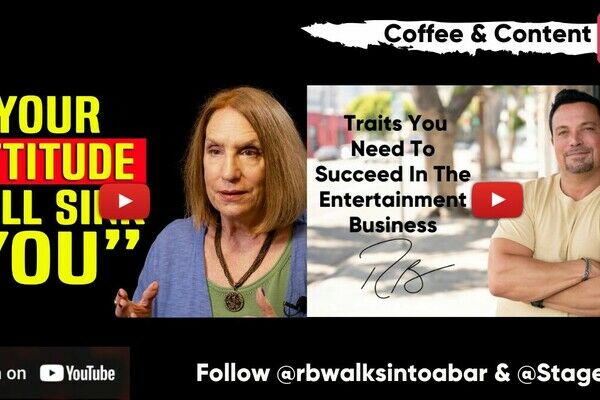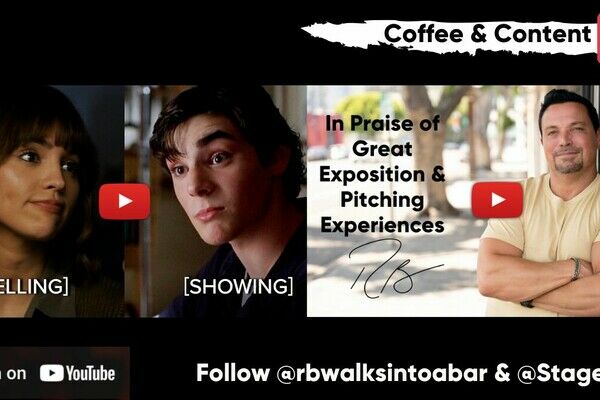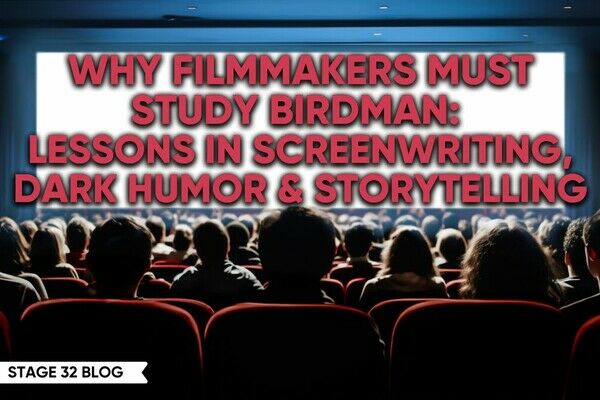Hard Truths and Etiquette
My name is Erik. I'm Stage 32 Happy Writers coordinator, a writer and the son of a father born to excel in the corporate world – and as a Senior Executive at one of the most prestigious hospitality companies in the world, he did. You can tell I'm classy because I say “hospitality company” instead of “hotel chain”. My upbringing was one of reason, commerce, and common sense which, despite the specific machinations of economy and industry, Corporate America lives and dies on.
I know there are writers screaming “foul” at the idea of treating writing like a business. After all, we writers deal in art. We write to fulfill an undying need to communicate: a story, a heartbreak, a triumph; lingering thoughts and voices until we finally put them to the page all in the pursuit of something above ourselves. Truly worthy goals...
So is wanting to get paid.
The counterculture movement is over. Punk's dead, Pete Townshend sucks live, and there's a McDonald's in Vietnam. Capitalism is king. Read closely, take these terms of etiquette to heart and let them take you farther in this industry than any clever piece of dialogue (or prose).
RESPECT THE INBOX
Do you know how many emails people get in this industry on a daily basis? A few hundred emails a day is amateur hour. What this means for you is that you need to think economically with your emails:
- In your first email to an executive, do not pitch them 5 projects they haven't asked about. They will always ask for other ideas if they are interested.
- Don't prattle on about your personal life unless they ask or unless it's directly related to how or why you wrote the script. They honestly do not care that your nephew just graduated middle school.
- If they say “yeah, I'd like to read that script”, they are expecting an email with one attachment: your script. It's annoying when you're expecting one attachment and instead receive twelve (“here's my script, my bible, a letter of interest from that actor who was big in the 90's, coverage reports and a synopsis!”). List out what ancillary material you have, if they want to take a look at any of it, they will ask.
- If the executive introduces himself as Jonathan, don't call him Jon (consider for a moment that this actually needs to be said).
- Your email signature should absolutely not contain loglines. All that tells an executive is that everyone you have ever emailed has seen that logline and said, “pass” (doesn't matter if it isn't true).
- "Please" and "thank you". Common courtesy is something that's fallen by the wayside with the truncated messages of the digital age. Adding in something as simple as "please" and "thank you" will absolutely set you apart as a polite, professional and gracious writer to be worked with.
CHOOSE YOUR EMAIL ADDRESS WISELY
Rolodex be damned, between remembering company names, script names, writer names, who works where, who works with who and on what projects, do you really think an executive is going to remember that John Doe's email address isn't some variation of John.Doe@gmail.com, but is in fact: WriterSurferLlLL1956@poverty.com
They won't.
Consider the following: we had two executives in the Stage 32 offices for pitch sessions, one from an extremely prestigious talent agency and one from a production company that has a first-look deal with Warners. As sometimes happens in our office, these two execs got to chatting... and then it happened:
The production executive told the agent that they were looking for a thriller that was contained in somewhere other than a house (think SPLINTER [2008]). The agent went wide-eyed with excitement and pulled out his cell-phone. He had “just the script they were looking for” - a newer writer they hadn't signed yet, but wanted to. The production executive was excited, “Send it to me!”.
I then watched as, for five straight minutes, the agent executive searched his email trying to find this writer's script. He searched the script title – nothing. He searched the writer's full name – nothing. Last name – nothing; first name – nothing. The executive put his phone away and said “nevermind”.
That movie could have been made by a major studio and the opportunity was lost because the executive couldn't easily locate the writer's email.
I touched base with that executive when I sent him the screenplays he requested, and he told me he eventually found the writer's email address. It was something akin to hushpuppies@geocities.io.eu His script had been attached as “First Draft” along with a date. Me and the rather annoyed executive agreed: that writer deserved to miss an opportunity of a lifetime.
If your email isn't some fixed variation of your first and last name, you're actively hurting your career. It's the 21st Century – Gmail accounts are free. There is no reason, nor should there be any expectation that an executive is going to remember an out-of-the-box email address. Also, when attaching a script (or anything) save it as FirstNameLastName_DocumentTitle. Front page of the script should have your email, contact information and the date.
Our more astute readers are probably realizing the common denominator between these tips:
CLARITY IS KING
Clarity is paramount. Clarity in emails, clarity in pitching, and more than anything, clarity in your script.
We've all gotten the feedback before: one executive or another just didn't "get" something in our script. They seem apparently unable to understand the vast complexity and genius of our latest creation. "They just don't get it, man."
Frank Ponce, one of our writers who recently found success through Stage 32 (read more here) said something I believe bears repeating: one of the first things you'll learn when finally making that first step into Hollywood is that yes - it is your fault if readers aren't "getting" something.
You need to take responsibility for your writing. Clarity is your number one goal. Before originality, before creativity comes clarity. Remember: you know more about your script than anyone else. The writer has an assumed understanding of their world that you need to adequately relate to the reader. The onus is on you to make sure the themes and subtleties of your script are perfectly clear. Audiences don't get a crib sheet for your movie. You don't get the opportunity to explain things to them outside of whatever is written in your script.
Your Production Company Is Hurting You
Don’t mention your production company in the pitch. No one has heard of it. Seriously, mentioning some no-name production company no one has ever heard of is not doing you any favors and it raises more questions than it answers.
Most financing companies don't get a logo at the start of the movie, why would your production company that you LLC'd on a whim because you were bored get a logo alongside Blumhouse or Dimension? Because you wrote the script? Unfortunately, no.
Contrary to popular belief, it's not impressive when you put “Old Man Films” at the end of your email. If you spend time talking about your production company, it's time you're not spending talking about your story or characters and the executive will think you're covering up for the fact that your script is lacking.
What Does Networking Really Mean?
Let's get one thing straight: networking events in Los Angeles are not events where people get together to solely discuss work or future projects. The only ones worth going to are held at bars with generous happy hours. These events are still important. Hollywood is one of four businesses where it's all about relationships and who you know - the other three being politics, slavery, and prostitution.
Jokes aside, that's what these networking events are really about – getting to know people. When you go in on a project, you're committing yourself to months, maybe years of working with that person. How many productions have been squandered, how many millions lost because of some development or on-set drama? That's money the producers don't get back. Executives want to make sure they know the people they’re getting into bed with aren’t going to throw a temper tantrum. Your goal: be easy to work with.
So yeah, let's work on getting our act together. These are just a few of the etiquette tips or hard truths you need to take to heart when pursuing a screenwriting career. Please at the very least, get a simple email address.
About Erik:
Erik Grossman is the Stage 32 Happy Writers Coordinator and a writer who's worked with Sunblock Studios on projects ranging from documentaries (Zedd: Moment of Clarity with Vevo), to reality shows and short films (The Sweeter Side, Apartment 4, Grand Theft Auto: Give Me Liberty). He's worked on projects for companies such as Publicis, Fifteen Minutes Public Relations, and Brian Graden Media. He completed a short film starring Edi Gathegi (Twilight franchise, Justified), Max Carver (Desperate Housewives, Teen Wolf), and J.R. Bourne (Stargate SG-1, Revenge). Erik graduated USC with a bachelor's degree in English, and participated in a six-week film program in Australia. He currently resides in Los Angeles with his two overweight cats.
Like this blog post? Please share it on social media (Facebook, Twitter, LinkedIn, email etc) by using social media buttons at the top of the blog. Or post to your personal blog and anywhere else you feel appropriate. Thank you.
As always, we welcome thoughts and remarks on ANY of the content above in the Comments section below...
| Cannes 2016 in Competition: “The Wailing” Opens in U.S. June 3 |
| SydneysBuzz - Cannes Emerging Talent |
Search Stage 32 Blog
There are now 3681 blog posts for you to enjoy. Search them all by tags below.
Acting, Advice, Cinematography, Coffee & Content, Composing, Contests, Distribution, Featured, Filmmaking, Financing, Inspirational, Networking, Producing, Screenwriting, Success Stories, Tips, Trending,Relevant Tags
Recommended Articles

The [Ultimate] 5-Step Sound Guide for Great Sound on Set

Coffee & Content: Traits You Need To Succeed In The Entertainment Business

Own The Future: Why I Believe Screenwriters Should Embrace AI

6 Things To Know About Script Legal Research

Coffee & Content: In Praise of Great Exposition & Pitching Experiences

Why Filmmakers Must Study Birdman: Lessons in Screenwriting, Dark Humor, and Storytelling

How Did You Get That Gig?

Stage 32 Certification Welcomes El Paso, Texas!

Celebrate the November 2024 Stage 32 Community’s Successes




